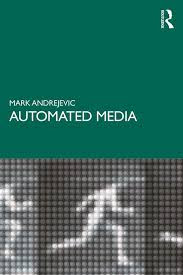Pessimism of the intellect...
A couple of thoughts in response to Alex Burns's
mediations on a somewhat
anguished Tweet I launched on a Friday afternoon. In most cases, the various responses to the Tweet took it in the spirit in which it was offered: as concern about the seemingly inevitable colonization of higher education by the tech industry, exacerbated by the restrictions ushered in by the current pandemic.
Some read it, a bit more hostilely, as a selfish focus on cashing out before succumbing to a system that is antithetical to my academic values and commitments.
Such is the destiny of Tweets.
For the record, I intend to do what I can to resist the commercial platforming of higher education, in keeping with an academic career that has been devoted to identifying and critiquing the pathologies of digital capitalism. That does not mean I'm particularly optimistic with respect to the outcome. There is too much administrative support for such a move -- and, as Burns's post indicates, significant buy-in among academics, at least in certain contexts. At the same time, I've had the good fortune to work and be trained in academic institutions that will likely be among the holdouts, and for that I applaud them and will continue to support them however I can.
I don't know Alex, though I take him to be a person of good will, and I suspect the future belongs to him and other like minded people. Maybe that's good news for them. I don't think I share their particular vision for the social role of higher education, and I worry about the consequences of such a vision for the character of our social world.
I am just going by the one post - so I am likely missing some very important context -- but there are some moments in the post that prompted this response. The first is a conspicuous absence in the definitions of education on offer. The choices Burns provides are higher education as contributing to "knowledge creation," serving as a form of "elite reproduction," or, finally, one more version of capitalist alchemy: a way of turning student fees into land grabs and retirement savings (a dig at the original Tweet).
None of these really speak to the core mission of the University, as I understand it: education. Missing, for me, in this list, is the process itself: fostering a community and culture of thought (for both researchers and students) informed by the achievements of humankind in ways that contribute to a critical and constructive engagement with the world.
I realize the definition of "achievements" is a contested one, and the field for enabling and recognizing these has long been warped -- but this contestation and an ongoing reckoning with the forms of power that shape knowledge production seem part of the culture of thought promoted by such an education.
I imagine the reference to elitism in Burns's post is meant to encompass this view of the role of education. The charge of elitism is often deflected toward the content of particular forms of thought and the knowledge with which these are associated, when perhaps the actual target is the conditions of its production and reproduction. To restrict the forms of understanding and knowledge to which I'm referring to a select, privileged, group (through, for example, making a liberal arts degree prohibitively expensive), is elitist. The way to challenge this form of elitism is not to do away with such an education altogether, but to make it available to all who are interested, and, in so doing to transform and enrich it (to reconfigure the content by addressing the deformations associated with the elite conditions of access that shaped it).
By way of response, I would press against the ready equation of technology with the commercial tech sector. I realize that the latter is at the forefront of technological development, but I think there is still a meaningful difference between imagining constructive uses for new technological affordances and merging higher ed with the commercial tech sector.
What worries me about the spectre of a tech-sector takeover is that the result may well be regressively elitist: reserving the type of education I associate with the University to a few pricey holdouts. Perhaps this is simply a function of my being woefully out of touch with my time. However, I would resist the accusation of nostalgia: the version of higher education to which I remain wedded is one that has only ever appeared as a potentiality. The commercial, corporate capture of the University would most likely extinguish it altogether.
It's hard for me to get enthusiastic about the platform commercialization of research metrics. Burns refers to the prospect of commercial platforms showing us the, "20% of your research outputs that are having the 80% readership impacts." I suppose this is meant to shape our research the way audience ratings might shape the development of a TV show, or how market research might contribute to product development. Who wants to spend their time on research that doesn't have "impact"?
Nonetheless, I don't think we should take for granted the currently fashionable term "impact" and its relation to the various proxy measures that represent it. In the highly metricised research environment in which we operate, it means how many times an article gets cited, shared, or mentioned (not necessarily read). It is a quantitative measure that doesn't tell me whether or how the piece changed how someone might see or think about or act in the world. It doesn't tell me how this research might influence the classroom experience of my students and their understanding of the world.
It is, for all practical purposes, a metric that, through a series of transformation, can be monetized. (citations=impact=rankings=student fees). Platform capitalism, natch. That doesn't mean important qualities are necessarily excluded from "impact" or that citation numbers don't have any relation to what they're meant to serve as a proxy for. We all want our work to enter into the conversation.
However, it does underwrite a tendency for the proxy to displace the real goal, and we know how that plays out. The notion -- imported from marketing -- that the proxy has some kind of predictive value is, I suspect, a deeply problematic one. I've got a couple of friends who, very early on in the era of digital media studies, started working on copyright issues. At the time, very few in the field were working on the topic, so who else would cite them, anyway?
It turned out they saw something others did not, and they built successful careers on the foundations of this work. By contrast, platform algorithms give us the kind of endless repetition that has come to characterize so much of our data-driven culture. I doubt they're much good for guiding original, ground-breaking research. They can tell us after the fact, that the research got attention -- which is fine -- but that's about it.
The other provocative moment in the post, for me, is the reference to the increasing cost and allegedly diminishing productivity of academic labor. I'm not sure what the reference point here is, but the stats I've seen show some measures of productivity on the rise. Research outputs have been increasing. Although this varies across fields, student-faculty ratios have also been increasing. I suppose this speaks to productivity in some way, but I don't greet either of these as positive developments -- they are driven by economic logics that have been promulgated by another trend: the increase in administrators per student (perhaps this speaks to the issue of diminished productivity?).
None of this should be read as a blanket critique of technological innovation. My target is the commercialization of higher education. I have yet to see evidence that commercial platforms are equipped to support the type of intellectual engagement and culture that is crucial to higher education as I understand and experience it. There is certainly a version of higher education that tech companies will be able to implement, and they will likely do it much more efficiently and profitably than universities can. However, I worry it will be unable to provide the type of thought and understanding we will need to address the pathologies of the current moment -- many of which are associated with those companies most likely to take a lead in "disrupting" higher education. I'm wary of the recurring tech industry promise that only the spear that inflicted the wound can heal it.












